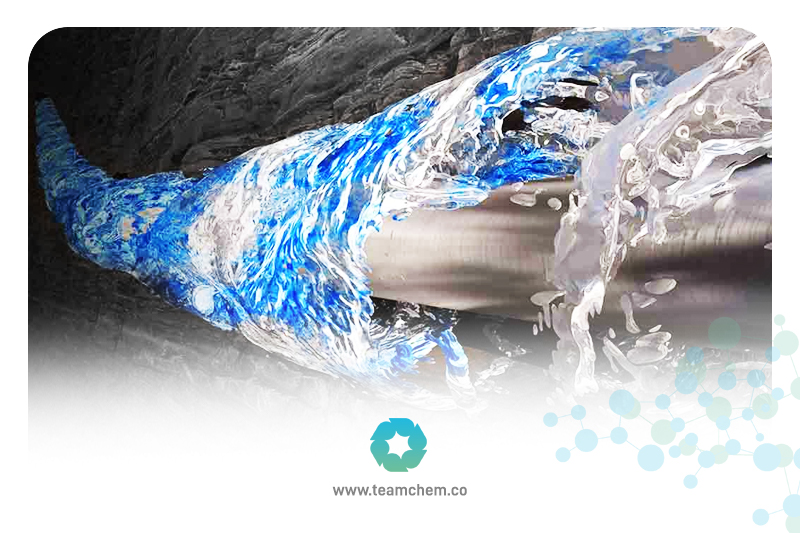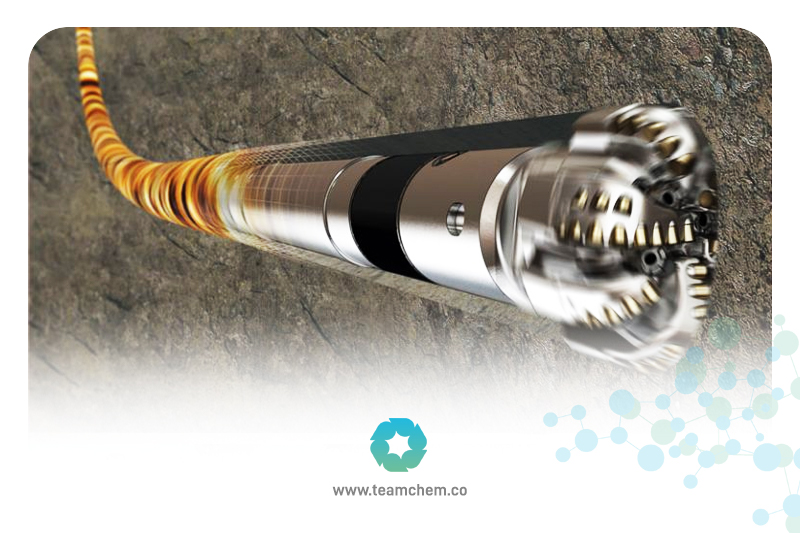Think calcium chloride is just a simple salt? Think again! This seemingly unremarkable compound plays a surprisingly crucial role in the oil and gas industry, enhancing drilling efficiency and maximizing production. The following article aims to illuminate the importance of this not-so-simple salt.
Introduction to Calcium Chloride
Calcium Chloride (CaCl2) is a salt, but not the kind you should add to your cucumber salad (or any other food, for that matter). While it is used in food processing in small amounts, the type of the Calcium Chloride used in the oil and gas industry is a different beast altogether (and of course, is not intended for consumption). And in this article the focus will be on this specific type of Calcium Chloride: The industrial grade.
Calcium Chloride: A Versatile Solution
As the name suggests, Calcium Chloride is formed from the ionic bond between calcium and chlorine. This seemingly simple salt plays a critical role in oilfield operations ranging from drilling and completion to well stimulation and production optimization.
Calcium Chloride is a relatively inexpensive alternative to many specialized drilling additives. It is also compatible with a wide range of other drilling fluid components. Team Chemicals specializes in providing Calcium Chloride solutions and expertise for diverse oilfield applications. But first, let’s explore the surprisingly crucial role CaCl2 plays in the oil and gas industry.
The Role of Calcium Chloride in Oil and Gas Operations
Calcium Chloride is a vital component in oilfield operations. While it has various applications, its two most common uses are as a drilling fluid additive and in well stimulation.
Applications of Calcium Chloride in Drilling Fluids

Drilling deep beneath the earth to extract precious crude oil is a tasking endeavor. It often involves challenges including unstable formations that can lead to wellbore collapse, unexpected pressure variations that threaten safety, and extreme temperatures that can compromise equipment. But this unassuming compound – calcium chloride – provides surprisingly effective tools to overcome some of these drilling obstacles.
Calcium Chloride for Shale Stabilization:
Shale formations are rich in clays, which tend to absorb water from drilling fluids. This can cause the clays to swell and disperse (break apart), compromising the integrity of the wellbore.
Calcium Chloride, when dissolved in the drilling fluid, releases calcium (Ca++) ions. These ions attract negatively charged clay particles, creating a flocculation effect. Flocculation essentially means the clay particles clump together instead of dispersing, forming a more stable barrier around the wellbore and preventing wellbore collapse.
Calcium Chloride for Density Control:
Drilling fluids require a certain level of density to be able to counterbalance the pressure of downhole formations (underground rock layers) and prevent blowouts (where fluids escape uncontrollably up the wellbore).
Calcium Chloride is a highly soluble salt, making it an effective weighting agent to increase drilling fluid density and prevent blowouts.
Calcium Chloride for Freezing Point Depression:
Drilling involves a lot of friction that generates heat, but believe it or not, drilling fluids can still freeze in cold-weather environments or deepwater drilling where temperatures drop significantly.
Calcium Chloride significantly lowers the freezing point of water, ensuring drilling fluids remain functional in cold conditions.
Calcium Chloride for Fluid Loss Control:
When a well is drilled through a porous formation, the drilling fluid can seep into those pores instead of fully circulating back up the wellbore. This loss of fluid damages the equipment and increases operation costs.
Calcium Chloride helps to minimize fluid loss by interacting with clays and creating a less permeable barrier along the wellbore.

Calcium Chloride for Well Stimulation:
Well stimulation refers to a range of techniques applied during drilling operations to enhance the way fluids flow from the reservoir rock into the wellbore. Calcium Chloride is mostly used in hydraulic fracturing for helping prevent clay swelling within the created fractures. It also aids in the cleanup of residual and debris from the wellbore, minimizing the risk of clogging or equipment damage and improving production efficiency.

Other Applications:
Calcium Chloride finds uses in dust control on roads and industrial sites, as a desiccant in dehumidifying applications, and in concrete acceleration to aid faster setting.
Benefits of Calcium Chloride in Oil and Gas Production
As already discussed in length, Calcium Chloride provides solutions throughout the well's lifecycle, from the initial drilling phase through to optimizing production. Here are the key benefits it delivers:
Cost-Effectiveness: Calcium Chloride is an economical solution compared to many other drilling additives, offering significant cost savings while delivering reliable results. Suppliers like Team Chemicals offer a reliable source of Calcium Chloride tailored for specific industry needs.
Enhanced Wellbore Stability: Improved wellbore stability due to Calcium Chloride reduces the risk of drilling complications, such as wellbore collapse and stuck equipment. This minimizes costly non-productive time.
Increased Production Rates: By promoting wellbore integrity and optimizing various well stimulation techniques, Calcium Chloride helps maximize production potential and enhance overall well profitability. Additionally, reducing drilling complications and equipment wear indirectly boosts production rates over time.
Operational Flexibility: Calcium Chloride is highly compatible (cacl2 soluble) with other drilling fluid additives, offering flexibility in designing fluid systems tailored to specific needs and formation challenges.
Reduced Equipment Wear: Calcium Chloride's role in shale stabilization and cuttings transportation helps to protect drill bits and other downhole equipment, extending their lifespan and reducing replacement costs.
Environmental Considerations and Calcium Chloride Use
While Calcium Chloride offers operational advantages, responsible use is essential to minimize potential environmental impacts. Key considerations include:
Potential for Soil and Groundwater Contamination: Careful handling and disposal practices are crucial to prevent environmental contamination. Spills or improper disposal can release Calcium Chloride into soil or groundwater, affecting water quality and ecological balance.
Biodegradability: Calcium Chloride is biodegradable and is naturally present in the environment to a certain degree. However, excessive release can disrupt natural salinity levels, potentially causing harm to aquatic life or vegetation.
Alternatives: Research is ongoing to find eco-friendlier alternatives, particularly in areas with strict environmental regulations. Some substitutes can include blends of Calcium Chloride with less soluble salts like sodium carbonate (forming Calcium Chloride sodium carbonate mixtures) or mixtures with other compounds like calcium carbonate and sodium Chloride to reduce overall salinity impact.
Handling and Storage of Calcium Chloride in Oil and Gas Operations
Safe handling and storage of Calcium Chloride are paramount in oil and gas operations. This ensures personnel well-being, environmental protection, and maintains the compound's effectiveness. Let's explore some of the best practices for responsible use of this versatile salt:
Personal Protective Equipment (PPE): Chemical-resistant gloves, goggles, and protective clothing are mandatory when handling Calcium Chloride to prevent skin or eye irritation.
Storage Conditions: Calcium Chloride must be stored in cool, dry, and well-ventilated areas away from incompatible materials. Its hygroscopic nature means it readily absorbs moisture, potentially leading to clumping or release of heat. Calcium Chloride anhydrous, being devoid of water, is less prone to clumping.
Spills and Leaks: Spills or leaks must be promptly contained and cleaned up according to established safety protocols, using proper containment equipment and neutralizing any affected areas.
Compatibility: It's vital to ensure that Calcium Chloride is compatible with other drilling fluid additives prior to use. Incompatible substances can lead to unwanted reactions, compromising fluid properties or creating hazardous conditions.
Future Trends and Innovations in Calcium Chloride Usage
The use of Calcium Chloride in the oil and gas industry is dynamic and continues to evolve. Here are some potential future trends and innovations that could significantly impact its role:
Environmentally-Friendly Formulations: Continued development of Calcium Chloride blends with reduced environmental impact is crucial. Suppliers like Team Chemicals are actively engaged in research and partnerships to develop innovative and eco-conscious solutions. These formulations prioritize biodegradability and minimize potential contamination risks, making them ideal for use in environmentally sensitive areas.
Nanotechnology Applications: Research into nanotechnology could lead to the development of enhanced Calcium Chloride formulations. Nano-sized particles could offer improved stability, efficiency at lower concentrations, and reduced interaction with certain clays, creating a more versatile and sustainable solution.
Enhanced Oil Recovery (EOR): Investigations into the use of Calcium Chloride in EOR methods are ongoing, particularly in challenging reservoirs where traditional methods may be less effective. Potential applications include modifying wettability and tailoring injection fluids in specific EOR scenarios.
Data Analytics and Optimization: Combining data analytics with Calcium Chloride usage could lead to significant advancements. Analyzing real-time drilling and production data could help predict drilling fluid properties, optimize Calcium Chloride concentrations (available forms include Calcium Chloride flakes, pellets, crystals, powder, or solutions like Dowflake Calcium Chloride), and forecast well performance for improved decision-making.
Partner with TEAM Chemicals to Harness the Power of Calcium Chloride
Calcium chloride is a cornerstone component with applications even outside the oil and gas sector, like the calcium flakes often added to pools. Its ability to enhance drilling efficiency, stabilize formations, improve production rates, and offer cost-effective solutions makes it a highly valuable tool. As the industry continuously seeks ways to optimize operations and maximize production, partnering with experts like TEAM Chemicals ensures access to both high-quality calcium chloride and the knowledge to use it effectively.